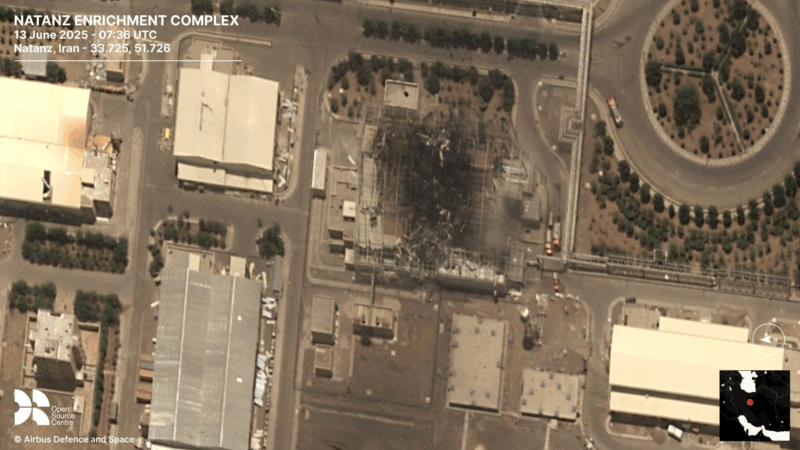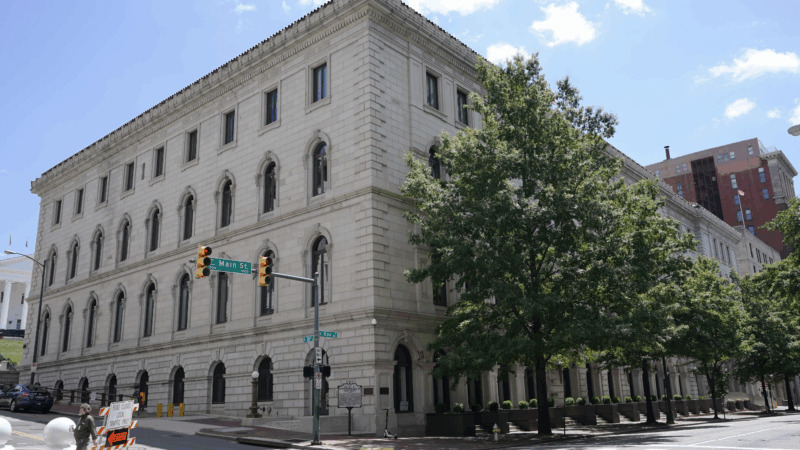Israel expands strikes on Iran’s nuclear facilities
As part of a broad strike on Iran, Israel has attacked several of the country’s key nuclear facilities.
The first and most visible strike took place in the opening hours of the Israeli air campaign, which began overnight on Thursday. In a statement the Israeli military said that fighter jets had struck Iran’s largest enrichment facility at Natanz. “As part of the strikes, the underground area of the site was damaged. This area contains a multi-story enrichment hall with centrifuges, electrical rooms, and additional supporting infrastructure,” the statement read in part.
Video posted online and verified by NPR showed black smoke billowing from the Natanz site early Friday morning local time. A set of images from the commercial satellite company Airbus showed damage to the main electrical substation at the facility and to buildings used to assemble and run centrifuges.
By Friday afternoon, there were additional reports of Israeli strikes near Iran’s other main enrichment facility at Fordow, and at Isfahan, which is also home to a nuclear research complex. So far, little is known about those strikes, which have taken place in the second night of fighting.
Loading…
In a statement, the Atomic Energy Organization of Iran said that the attack at the Natanz plant caused damage but that no radioactive or chemical contamination had leaked outside the site.
Rafael Mariano Grossi, the head of the International Atomic Energy Agency, condemned the attack.
“I have repeatedly stated that nuclear facilities must never be attacked, regardless of the context or circumstances,” Grossi said during a meeting of the agency’s board of governors.
The Natanz facility has been at the center of Iran’s nuclear program for decades. According to the IAEA, which has been monitoring activities at the site for the past several years, Iran has recently been using thousands of centrifuges to enrich uranium to 60%, far above the levels normally used in civilian nuclear reactors. The agency says that Iran has stockpiled more than 400 kilograms of the highly enriched material, enough by some estimates to quickly build around 10 nuclear weapons.
It’s unclear how quickly that material could practically be converted into bombs. During the enrichment process, the uranium is stored as a gas. It must be separated and converted into metal, which in turn must be fashioned into components for a nuclear device. Iran had a covert program to research such a weapon in the early 2000s, but it has never built a nuclear weapon before, and has said publicly it has no intentions to pursue one.
In a statement shortly after the strike, Prime Minister Benjamin Netanyahu said that Israel believed Iran had recently restarted its program to build a nuclear weapon. “If not stopped, Iran could produce a weapon in a very short time,” he said in prepared remarks shortly after the strike. The operation’s goal, Netanyahu stated, was to “strike at the heart of Iran’s nuclear enrichment program.”
Preliminary analysis of satellite imagery at the site suggests the damage from the first wave of attacks was actually limited, according to Jeffrey Lewis, a professor at the Middlebury Institute of International Studies who has tracked Iran’s program.
Images from satellite company Airbus showed damage to several buildings at the Natanz site that are used to assemble centrifuges. The images also showed damage to support equipment, including an electrical substation and buildings that may provide power and access to the underground structures at the site.
“That’s likely to disrupt operations at the plant, but crucially, what they didn’t do was find a way to destroy the thousands of centrifuges that are buried underground,” Lewis says.
Lewis also saw no evidence that Israel had struck at tunnels deep beneath a nearby mountain. Iran was reportedly digging those tunnels to create a more fortified facility for its centrifuges. In recent days it had pledged that it would accelerate development of a third centrifuge site, possibly in the mountain facility.
Lewis says he wonders whether military force can truly eliminate Iran’s nuclear program. In the end, he says, there is no single facility or scientist that holds the key to the entire nuclear enterprise in Iran.
“Unless the Israelis can keep bombing them indefinitely,” he says, “they will always have the ability to technically reconstitute the program if they make a decision to do so.”
Federal judge acknowledges ‘abusive workplace’ in court order
The order did not identify the judge in question but two sources familiar with the process told NPR it is U.S. District Judge Lydia Kay Griggsby, a Biden appointee.
Top 5 takeaways from the House immigration oversight hearing
The hearing underscored how deeply divided Republicans and Democrats remain on top-level changes to immigration enforcement in the wake of the shootings of two U.S. citizens.
Snowboarder Chloe Kim is chasing an Olympic gold three-peat with a torn labrum
At 25, Chloe Kim could become the first halfpipe snowboarder to win three consecutive Olympic golds.
Pakistan-Afghanistan border closures paralyze trade along a key route
Trucks have been stuck at the closed border since October. Both countries are facing economic losses with no end in sight. The Taliban also banned all Pakistani pharmaceutical imports to Afghanistan.
Malinowski concedes to Mejia in Democratic House special primary in New Jersey
With the race still too close to call, former congressman Tom Malinowski conceded to challenger Analilia Mejia in a Democratic primary to replace the seat vacated by New Jersey Gov. Mikie Sherrill.
A daughter reexamines her own family story in ‘The Mixed Marriage Project’
Dorothy Roberts' parents, a white anthropologist and a Black woman from Jamaica, spent years interviewing interracial couples in Chicago. Her memoir draws from their records.






